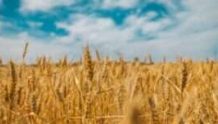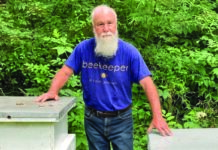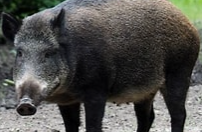From the Office of Public Affairs | http://www.news.ku.edu
Headlines
New NSF report guides research into climate change’s effect on human security
LAWRENCE — How might human-driven climate change trigger food shortages, water scarcity, armed conflict or future pandemics? Conversely, could a changing environment strengthen bonds of community in some places? A group of scientists, including a University of Kansas researcher, recently delivered a major report to the National Science Foundation recommending research priorities to maximize understanding of climate change’s social impact in the U.S. and worldwide.
KU researchers land grant to support children’s families when removed from parents’ homes
LAWRENCE — University of Kansas researchers have secured a five-year, $2.5 million grant to help support children’s relatives and family members to care for them when they are removed from their parents’ home and placed in the foster system. The project, known as Kansas Invests in Families, or KinVest, will improve policy and practices as well as provide resources to caregivers and those working across the foster care system.
Cyberattack on Colonial Pipeline affected gas prices far less than initially reported, study finds
LAWRENCE — In May, the Colonial Pipeline was shut down due to a ransomware attack by Russia-linked cybercriminals. As the largest fuel pipeline in the U.S., its six-day stoppage led to fuel shortages and price increases. But how much the shutdown actually affected these outcomes is the subject of a new article titled “The Effect of the Colonial Pipeline Shutdown on Gasoline Prices.” It’s published in Economics Letters.he
Full stories below.
Contact: Brendan Lynch, KU News Service, 785-864-8855, [email protected], @BrendanMLynch
New NSF report guides research into climate change’s effect on human security
LAWRENCE — How might human-driven climate change trigger food shortages, water scarcity, armed conflict or future pandemics? Conversely, could a changing environment strengthen bonds of community in some places?
A group of scientists recently delivered a major report to the National Science Foundation recommending research priorities to maximize understanding of climate change’s social impact in the U.S. and worldwide. The report, titled “Environmental Change and Human Security: Research Directions,” was presented this week at the Fall Meeting of the American Geophysical Union in New Orleans.
Shannon O’Lear, professor of geography and director of the Environmental Studies Program at the University of Kansas, was one of 10 authors from diverse disciplines who produced the study as part of their work on the NSF’s Advisory Committee on Environmental Research and Education.
“We were tasked to report on how the NSF should be thinking about environmental change and human security and the kinds of research they should fund to understand dynamics between them both,” she said. “We started this three years ago. The process took longer than we planned, because we did a series of interviews with people in the intelligence community, former and current military decision-makers and policymakers. We realized we needed to not just take an academic view but to understand how different streams of input and insight feed into what we mean by ‘environmental change’ and what we mean by ‘human security.’ We wanted to understand how different practitioners interpret these processes in their work.”
O’Lear, whose research focuses on environmental geopolitics, critical geopolitics and human-environment relationships, was one of the few social scientists who collaborated in preparing the report.
“Climate change and environmental change tend to be discussed in the language of physics and the physical sciences,” she said. “But think how different it could be if our understanding had emerged in the language of social science. We’d be having really different conversations right now about climate change if we didn’t talk mostly about parts-per-million in the atmosphere or temperatures and gases — if instead we were talking about the social facets of the changing environment, and how society contributes to it and is impacted by it as more than a side note. As a geographer, I wanted to interject into the report the need to understand spatial connections of different features of the environment and human processes.”
O’Lear’s colleagues in producing the report were Ann Bostrom of the University of Washington; Anthony Janetos of Boston University; Sharon Burke of New America; Andrés Clarens of the University of Virginia; Geoffrey Dabelko of Ohio University; Peter Huybers of Harvard University; Patricia Matrai of the Bigelow Laboratory for Ocean Sciences; Julia Parrish of the University of Washington; Benjamin Preston of the RAND Corporation.
According to the authors, “Accelerating rates of anthropogenic environmental change are stressing human institutions and can present novel security threats to our nation. These changes manifest in many ways, such as in the extreme weather events that impact food and water systems, contributing to conflict, or in the human encroachment on critical ecosystems that drive disease transmission, as seen with COVID-19.”
O’Lear said grasping such complex consequences of human-driven climate change will require new research approaches to predict and mitigate how nations, societies and communities will be affected.
“With a lot of research, we try to understand human interactions with that physical science and change of environment by taking known social-science things, like conflict models, from political science — and then we think we could just add variables like drought or temperature variables into that model and understand how climate change will influence conflict — and that’s not really at all helpful,” she said. “We’re trying to point out the simple idea that ‘climate change is going to cause conflict’ does not acknowledge the rich, social complexities of possible human responses to a changing environment.”
Indeed, O’Lear said challenges brought on by a changing environment could be more complex, even potentially strengthening a sense of common purpose and community.
“We really have to unpack it with a lot more thoughtful nuance and ask, ‘How is the environment changing? What is the actual impact that’s having on people’s livelihoods, their day-to-day lives? How are changes exacerbated or eased by policy responses? How does that actually lead to different kinds of responses?’” she said. “It isn’t always hot, armed conflict. There can be lots of different responses — and it isn’t always negative. Sometimes you can find it to be cohesive, and that societies actually come together or collaborate more to address the climate change situation.”
O’Lear said she hoped the report would be used to influence research proposals and funding decisions going forward, based on eight key research questions formulated by the authors.
“We’re trying to understand what kind of measurements we’re taking of things — whether that’s the changing environment or the human response, like flood patterns and migration patterns — and ask, ‘Are those the right measures?’” she said. “What are the things that we should be measuring? And what are the kinds of questions that we should be asking? Are we asking these just because we’ve been collecting these data in one disciplinary area? It doesn’t mean we can just snap them together with data from some other disciplinary area and have something useful. So, we’re trying to help researchers and NSF think about how to get our arms around really complicated questions so that we can generate productive responses.”
-30-
————————————————————————
The official university Twitter account has changed to @UnivOfKansas.
Refollow @KUNews for KU News Service stories, discoveries and experts.
————————————————————————
Contact: Mike Krings, KU News Service, 785-864-8860, [email protected], @MikeKrings
KU researchers land grant to support children’s families when removed from parents’ homes
LAWRENCE — University of Kansas researchers have secured a grant to help support children’s relatives and family members to care for them when they are removed from their parents’ home and placed in the foster system. The project, known as Kansas Invests in Families, or KinVest, will improve policy and practices as well as provide resources to caregivers and those working across the foster care system, all with the goal of recognizing the importance of family in children’s lives.
This five-year, $2.5 million grant to KU is one of only five awards from the U.S. Department of Health and Human Services’ Administration for Children and Families Children’s Bureau. The grant will focus on improving stability and well-being for children removed from their homes by supporting placement with a family member or a person with whom they have a close relationship, such as relatives or kin. The goal is to promote shared parenting principles that guide kin caregivers, foster parents, staff, courts and other professionals in working supportively with parents and families of origin while their children are in foster care.
“If a child has to be placed in foster care, being in a situation where their relatives or kin is involved is very beneficial for their physical, social and emotional health. Unfortunately, that often doesn’t happen,” said Becci Akin, association professor of social welfare at KU.
Akin will serve as the principal investigator and project director of the grant, leading implementation of the work, along with co-director Amanda Brown, associate researcher in the KU School of Social Welfare.
KinVest will continue the KU team’s statewide partnership with the Kansas Department for Children and Families and include the Children’s Alliance of Kansas, Foster Adopt Connect, Kansas Family Advisory Network and the private providers of child welfare services across the state.
KinVest will develop a comprehensive model of training and resources for kin caregivers that can be delivered on-demand, in person or online to parents, kin caregivers and foster parents. Training will be delivered to staff at caregiving agencies as well so that staff and families have aligned training in supportive values and practices. This program aligns with Kansas DCF’s 2021 efforts to become a Kin First state, where networks of extended family and other supportive people in the child’s life are identified as soon as the child welfare system becomes engaged.
“We want to provide support for the people who are important in a child’s life. Our goal is to create learning opportunities across the entire system by working with families, professionals, agencies and court partners,” Brown said. “In supporting placements with relatives/kin first, we might prevent children from entering the foster care system at all.”
In addition to providing training and resources, KinVest will work to review and update policies that affect kinship families. The program partners will review policy in conjunction with volunteers from local advisory boards across the state. The policy review will then be presented to state policymakers to address barriers to placing children with relatives/kin and provide recommendations to better serve children and families.
Akin shared the example of a child living in Kansas near the Missouri border. If that child is removed from the home, it can be exceedingly difficult to place them with a grandparent who lives in Missouri. Though not prevented by law, placing a child in a home in another state requires excessive paperwork, and children can often end up placed in a home two hours away in Kansas with strangers instead of 15 minutes away in Missouri with a family member. Addressing such policies could go a long way in better serving families, researchers said.
Many states have goals of placing children in kin care. In Kansas, that goal is 50%, although the current average rate of placement with kin is less than 40% across the state, Brown said. KinVest will work in conjunction with other grant-funded projects in KU’s School of Social Welfare, including Kansas Strong for Children and Families and Family First. Previous research has shown those collaborations led to improved reunification rates for families.
In addition to providing training and open access resources, KinVest will contain an evaluation element to determine outcomes of developments.
“We want to know not only does it work, but how,” said Kaela Byers, associate research professor in social welfare at KU and lead evaluator for KinVest. “We’ll be looking at outcomes and evaluating data from families, caregivers and providers to understand from various perspectives how the services are working.”
While the KinVest project builds upon previous and ongoing work by the KU team to improve the foster care system and outcomes for children, it is the first effort to support kin caregivers specifically, meet their needs and address policy concerns relevant to their support of children. If successful, the goal is to demonstrate a statewide model to improve outcomes for Kansas children and families but to also serve as an example that can be replicated nationwide, researchers said.
-30-
————————————————————————
Don’t miss new episodes of “When Experts Attack!,”
a KU News Service podcast hosted by Kansas Public Radio.
https://kansaspublicradio.org/when-experts-attack
————————————————————————
Contact: Jon Niccum, KU News Service, 785-864-7633, [email protected]
Cyberattack on Colonial Pipeline affected gas prices far less than initially reported, study finds
LAWRENCE — In May, the Colonial Pipeline was shut down due to a ransomware attack by Russia-linked cybercriminals. As the largest fuel pipeline in the U.S., its six-day stoppage led to fuel shortages and price increases.
But how much the shutdown actually affected these outcomes is the subject of a new article titled “The Effect of the Colonial Pipeline Shutdown on Gasoline Prices.” It’s published in Economics Letters.
“We found the resulting increase in gas prices to be far less than the media initially reported,” said Tsvetan Tsvetanov, associate professor of economics at the University of Kansas.
“When looking at the six days from the closure to its reopening, there’s barely any price effect until the very end of this period. What we really saw was delayed and persistent impacts. So when we read in the news how the problem had been solved and the pipeline’s being reopened, that’s actually when we truly began to feel the effect of this.”
His article, co-written with KU doctoral student Srishti Slaria, uses daily regular gasoline price data at the city level and employs a difference-in-differences approach to address potential demand-side confounding factors. While in May, fuel prices spiked to levels that were the highest in seven years, Tsvetanov discovered the Colonial Pipeline incident only led to a 4-cents-per-gallon increase in average gasoline prices in affected areas.
Launched in 1963, the 5,550-mile pipeline is the nation’s largest for refined oil products. Its two tubes can carry 3 million barrels of fuel per day between Texas and New York.
“That’s basically the bulk of the supply of fuel for the East Coast and the Southeast,” Tsvetanov said. “Some of these 18 states have local refineries. Some can rely on imports. If they have the river or seaports, they can access that. But mostly it’s the Colonial Pipeline they rely on.”
In May, just prior to the attack, dependence on oil products was escalating.
“At the time, we were seemingly coming out of the pandemic situation,” he said. “The economy was growing, more jobs were being created. Those were all demand-side factors that were pushing gas prices up. So the trick is, how do you parse out what would have been happening regardless from the fact of the pipeline shock?”
Adding to the motivation behind this work was the “inelastic” nature of gas consumption in the U.S.
“Inelastic demand means that the demand for a particular good is not going to change much even as the price goes up,” Tsvetanov said.
“We do need gasoline, we need to drive to work, we need to consume a certain amount no matter what. We’re going to be spending that money. We’re not going to adjust our consumption even if gas prices go up. So when prices do go up, they hurt our consumption of other goods because we’re still consuming the same amount of gas. But there is less income left to spend on all these other goods and services.”
A native of Bulgaria who was raised in India, Tsvetanov is now in his seventh year at KU. He studies energy and environmental economics, specifically how individual household choices factor into energy efficiency and renewable resources. This is his first foray into economic research involving a cybercrime.
“Highlighting the threat of cyberattacks in the future is becoming more of a common topic,” he said. “This is one of those things where the more we see it, the more it perpetuates itself because criminals learn that they can do it and get away with it. It will be a race on both sides — a race to improve protection against it and then to get even better at cracking those new defenses.”
The Colonial Pipeline breach was the result of a single compromised password. Colonial paid the hackers (a group known as DarkSide) a $4.4 million ransom in Bitcoin days after their demand. But in June, the Justice Department recovered $2.3 million in cryptocurrency ransom. The hackers have not been caught.
What has been done to prevent future cyberattacks?
“The Department of Energy has requested an increase in their funding in their budget for 2022 for that specific purpose — to try to fix whatever it is to make their systems a little less vulnerable,” he said.
Ultimately, Tsvetanov is optimistic his Colonial Pipeline article can help raise awareness about how cybersecurity intersects with economics, especially in the energy sector.
“The hope is that any time you publish a short paper, it actually inspires more people to look into your topic. I’d be happy to see even more analysis, longer papers, different analysis setups that dig a bit deeper into this to enrich our results,” Tsvetanov said. “This is just the starting point.”
-30-
————————————————————————
KU News Service
1450 Jayhawk Blvd.
Lawrence KS 66045
Phone: 785-864-3256
Fax: 785-864-3339
http://www.news.ku.edu
Erinn Barcomb-Peterson, director of news and media relations, [email protected]
Today’s News is a free service from the Office of Public Affairs





